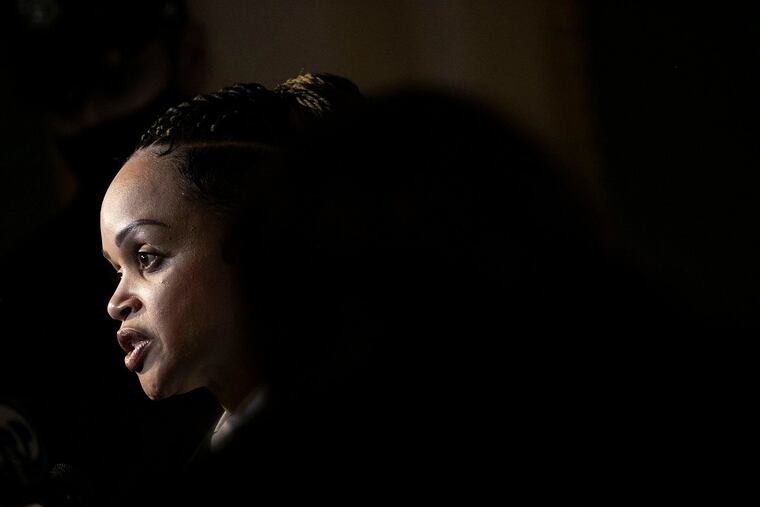As a Black Philadelphian, here’s what I’m looking for in the city’s next police commissioner
Fixing policing in Philadelphia is not about replacing Danielle Outlaw. It’s about drastically changing the racist systems that brought us to this point.

I’m sure there was muted joy in some corners of the law enforcement community when Philadelphia Police Commissioner Danielle Outlaw announced her resignation.
Some of Outlaw’s harshest critics never wanted an outsider in the first place, and felt vindicated by her coming exit. Others are seeking to promote themselves as the rightful heir to the throne. Still others — like the Fraternal Order of Police — are pushing their chosen successor, to stop the fight for officer accountability.
But fixing policing in Philadelphia is not about replacing Danielle Outlaw. It’s about drastically changing the system that brought us to this point.
No community knows this better than African Americans. We are overpoliced, underserved, and too often, the targets of police brutality. A return to the status quo might serve as a minor annoyance to others, but it could cost us our very lives. Therefore, as we seek to replace Commissioner Outlaw, Black Philadelphians must forcefully articulate what we demand of the person who will be chosen to follow her, and we must do so now.
We want law enforcement without racism.
Speaking that truth acknowledges that modern American policing is rooted in the Black Codes — laws that were created to monitor and imprison newly freed slaves at the close of the Civil War. Laws against vagrancy and joblessness made Black people susceptible to the 13th Amendment’s provision allowing convicted criminals to be enslaved. The police were charged with enforcing that system, and their racist mandates inform the bigotry of the present.
Just as racist Black Codes were meant to keep Black people out of “polite” society and firmly in their place, 21st century policing is too often used to keep Black people on the wrong end of the criminal justice system.
Racism is why Black people are more than three times as likely to be killed by police than our white counterparts.
Racism is why Black people are more likely to be stopped and frisked, although we are less likely than white people to have contraband or weapons.
Racism is why Black people are more likely to be arrested than white people.
And racism is what President Joe Biden referenced when he said that the mostly white mob of Capitol rioters on Jan. 6, 2021 were treated “very differently” than Black Lives Matter protesters would have been.
Philadelphia’s new police commissioner must recognize that racism in policing is real. Then that new commissioner must do everything possible to bring that racism to an end.
» READ MORE: Police Commissioner Danielle Outlaw is stepping down. Here’s what happens next.
We want presence without occupation.
In Philadelphia, as in other cities, the poorest communities are often predominantly Black, and they are also the places that were historically redlined. When banks refused to lend, and factories shut their doors, and companies declined to hire, and schools were unconstitutionally funded, poverty became entrenched. That led to crime. But rather than blaming the economic and social conditions imposed upon our communities, America — and its policing system — portrayed Black people as inherently criminal.
That’s why police in Black communities sometimes display the behaviors of an occupying army. They operate under the assumption that all of us are guilty, when in truth, most Black people do the same things as most other Americans. They go to work. They pay their bills. They raise their children. They try, in the face of every obstacle, to advance.
Police in Black communities must transform from an occupying force to a presence that is grounded in service. Officers must be community members who treat us with respect, not overseers who view us with disdain. That will only happen if the new police commissioner makes clear that respecting Black citizens is a requirement, not an option.
We want protection without abuse.
Black people will no longer accept brutality as the cost of safety. We will no longer believe that an unarmed Black person can cause gun-toting police officers to fear for their lives. We will not allow right-wing zealots to convince us that we must support abuse if it is meted out in the name of law and order.
We demand the same protections that white Philadelphians routinely receive, and getting them is not about bringing in a new commissioner. Getting them is about making sure police who break the rules are held accountable.
No police commissioner can do that by themselves. The system that employs them has to change.